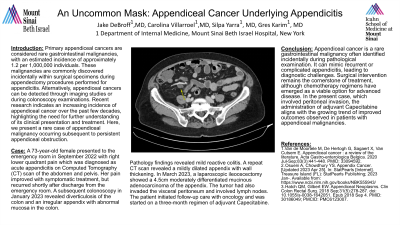Sunday Poster Session
Category: Small Intestine
P1290 - An Uncommon Mask: Appendiceal Cancer Underlying Appendicitis
Sunday, October 22, 2023
3:30 PM - 7:00 PM PT
Location: Exhibit Hall

Has Audio
- JD
Jake Debroff, MD
Mount Sinai Beth Israel
New York, NY
Presenting Author(s)
Jake Debroff, MD1, Carolina Villarroel, MD2, Silpa Yarra, MD1, Gres Karim, MD1
1Mount Sinai Beth Israel, New York, NY; 2Mount Sinai Beth Israel Hospital, New York, NY
Introduction: Primary appendiceal cancers are considered rare gastrointestinal malignancies, with an estimated incidence of approximately 1.2 per 1,000,000 individuals. These malignancies are commonly discovered incidentally within surgical specimens during appendectomy procedures performed for appendicitis. Alternatively, appendiceal cancers can be detected through imaging studies or during colonoscopy examinations. Recent research indicates an increasing incidence of appendiceal cancer over the past few decades, highlighting the need for further understanding of its clinical presentation and treatment. Here, we present a rare case of appendiceal malignancy occurring subsequent to persistent appendix obstruction.
Case Description/Methods: A 73-year-old female presented to the emergency room (ER) in September 2022 with right lower quadrant pain which was diagnosed as acute appendicitis on Computed Tomography (CT) scan of abdomen and pelvis. Her pain improved with symptomatic treatment, but recurred shortly after discharge from the ER. A subsequent colonoscopy in January 2023 revealed diverticulosis of the colon and an irregular appendix with abnormal mucosa in the colon. Pathology findings revealed showed mildly reactive colitis. A repeat CT scan revealed a mildly dilated appendix with wall thickening. In March 2023, a laparoscopic ileocecectomy showed a 4.5cm moderately differentiated mucinous adenocarcinoma of the appendix. The tumor had also invaded the visceral peritoneum and involved lymph nodes. The patient initiated follow-up care with oncology and was started on a three-month regimen of adjuvant Capecitabine.
Discussion: Appendiceal cancer is a rare gastrointestinal malignancy often identified incidentally during pathological examination. It can mimic recurrent or complicated appendicitis, leading to diagnostic challenges. Surgical intervention remains the cornerstone of treatment, although chemotherapy regimens have emerged as a viable option for advanced disease. In the present case, which involved peritoneal invasion, the administration of adjuvant Capecitabine aligns with the growing trend of improved outcomes observed in patients with appendiceal malignancies.

Disclosures:
Jake Debroff, MD1, Carolina Villarroel, MD2, Silpa Yarra, MD1, Gres Karim, MD1. P1290 - An Uncommon Mask: Appendiceal Cancer Underlying Appendicitis, ACG 2023 Annual Scientific Meeting Abstracts. Vancouver, BC, Canada: American College of Gastroenterology.
1Mount Sinai Beth Israel, New York, NY; 2Mount Sinai Beth Israel Hospital, New York, NY
Introduction: Primary appendiceal cancers are considered rare gastrointestinal malignancies, with an estimated incidence of approximately 1.2 per 1,000,000 individuals. These malignancies are commonly discovered incidentally within surgical specimens during appendectomy procedures performed for appendicitis. Alternatively, appendiceal cancers can be detected through imaging studies or during colonoscopy examinations. Recent research indicates an increasing incidence of appendiceal cancer over the past few decades, highlighting the need for further understanding of its clinical presentation and treatment. Here, we present a rare case of appendiceal malignancy occurring subsequent to persistent appendix obstruction.
Case Description/Methods: A 73-year-old female presented to the emergency room (ER) in September 2022 with right lower quadrant pain which was diagnosed as acute appendicitis on Computed Tomography (CT) scan of abdomen and pelvis. Her pain improved with symptomatic treatment, but recurred shortly after discharge from the ER. A subsequent colonoscopy in January 2023 revealed diverticulosis of the colon and an irregular appendix with abnormal mucosa in the colon. Pathology findings revealed showed mildly reactive colitis. A repeat CT scan revealed a mildly dilated appendix with wall thickening. In March 2023, a laparoscopic ileocecectomy showed a 4.5cm moderately differentiated mucinous adenocarcinoma of the appendix. The tumor had also invaded the visceral peritoneum and involved lymph nodes. The patient initiated follow-up care with oncology and was started on a three-month regimen of adjuvant Capecitabine.
Discussion: Appendiceal cancer is a rare gastrointestinal malignancy often identified incidentally during pathological examination. It can mimic recurrent or complicated appendicitis, leading to diagnostic challenges. Surgical intervention remains the cornerstone of treatment, although chemotherapy regimens have emerged as a viable option for advanced disease. In the present case, which involved peritoneal invasion, the administration of adjuvant Capecitabine aligns with the growing trend of improved outcomes observed in patients with appendiceal malignancies.

Figure: CT Abdomen/Pelvis
Disclosures:
Jake Debroff indicated no relevant financial relationships.
Carolina Villarroel indicated no relevant financial relationships.
Silpa Yarra indicated no relevant financial relationships.
Gres Karim indicated no relevant financial relationships.
Jake Debroff, MD1, Carolina Villarroel, MD2, Silpa Yarra, MD1, Gres Karim, MD1. P1290 - An Uncommon Mask: Appendiceal Cancer Underlying Appendicitis, ACG 2023 Annual Scientific Meeting Abstracts. Vancouver, BC, Canada: American College of Gastroenterology.
